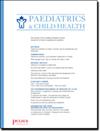A survey of caregiver preferences regarding research participation in the paediatric emergency department
IF 1.8
4区 医学
Q2 PEDIATRICS
引用次数: 0
Abstract
Abstract Objectives Emergency department (ED) visits can be stressful for families and can affect caregiver willingness to consent to participating in research. Our objective was to describe when and how caregivers wish to be informed about clinical research during their child’s ED visit. Methods An electronic survey was performed for families presenting to 10 Canadian paediatric EDs. A convenience sample of 1456 caregivers with children aged 0 to 17 years were enrolled. The survey tool was created (with an expert panel) using published methodological guidelines, including item generation/reduction, pre- and pilot-testing, and clinical sensibility assessment. Research-specific questions included the best time to be approached, the breadth of study opportunities presented, and best ways to encourage families to participate. Results Caregivers reported that the best times to be approached regarding research were in the waiting room (45.3%, 653/1441), after physician assessment (39.0%, 562/1441), or just prior to discharge (9.9%, 143/1441). 52.2% (351/672) wanted to hear about all available research studies, while 47.8% (321/672) wanted to be informed of studies relevant only to their child’s condition. Reported best ways to encourage families to participate in research included: incentives (e.g., gift cards/parking passes [31.2%, 230/737]), providing a clear explanation of study intent (30.7%, 226/737), and appealing to altruism (25.4%, 187/737). Conclusions There is wide variability in family preferences for timing of research-related conversations, suggesting that families could be approached in the waiting room, and if that is inconvenient or impractical, they could be offered a deferred conversation (i.e., after physician assessment or prior to discharge).一项关于参与儿科急诊科研究的护理人员偏好的调查
【摘要】目的急诊科(ED)就诊可能会给家庭带来压力,并影响照顾者同意参与研究的意愿。我们的目的是描述护理人员希望何时以及如何在他们孩子的急诊科访问期间被告知临床研究。方法对加拿大10个儿科急诊科就诊的家庭进行电子调查。本研究纳入了1456名照顾0至17岁儿童的护理人员作为方便样本。调查工具是(与专家小组)使用已出版的方法学指南创建的,包括项目生成/减少、预测试和试点测试以及临床敏感性评估。具体的研究问题包括最佳时间,提供的学习机会的广度,以及鼓励家庭参与的最佳方式。结果护理人员报告的最佳就诊时间为候诊室(45.3%,653/1441)、医师评估后(39.0%,562/1441)和出院前(9.9%,143/1441)。52.2%(351/672)的人希望了解所有可用的研究,而47.8%(321/672)的人希望了解仅与他们孩子的病情相关的研究。据报道,鼓励家庭参与研究的最佳方法包括:奖励(例如,礼品卡/停车卡[31.2%,230/737]),提供明确的研究意图解释(30.7%,226/737),以及呼吁利他主义(25.4%,187/737)。家庭对研究相关谈话时间的偏好存在很大差异,这表明可以在候诊室与家庭接触,如果不方便或不切实际,可以为他们提供推迟的谈话(即在医生评估后或出院前)。
本文章由计算机程序翻译,如有差异,请以英文原文为准。
求助全文
约1分钟内获得全文
求助全文
来源期刊

Paediatrics & child health
医学-小儿科
CiteScore
2.10
自引率
5.30%
发文量
208
审稿时长
>12 weeks
期刊介绍:
Paediatrics & Child Health (PCH) is the official journal of the Canadian Paediatric Society, and the only peer-reviewed paediatric journal in Canada. Its mission is to advocate for the health and well-being of all Canadian children and youth and to educate child and youth health professionals across the country.
PCH reaches 8,000 paediatricians, family physicians and other child and youth health professionals, as well as ministers and officials in various levels of government who are involved with child and youth health policy in Canada.
 求助内容:
求助内容: 应助结果提醒方式:
应助结果提醒方式:


